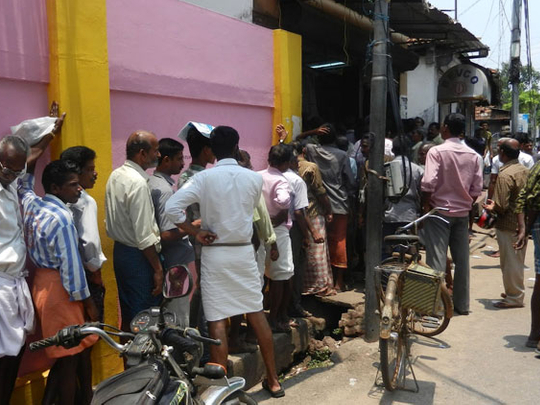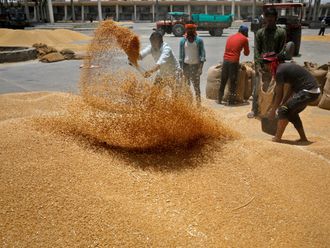
Thiruvananthapuram: India’s wettest state is planning to dry out, drop by drop.
Kerala, which has the country’s highest alcohol consumption per capita, is moving to become alcohol-free within 10 years.
Kerala Chief Minister Oommen Chandy, quoted in local media, said the state government was in favour of “total prohibition”.
From next April, only 5-star hotels will be granted bar licences.
A resident of Kerala typically drinks about 8.3 litres of alcohol per year, more than double the national average. Rum, whiskey and brandy are the state’s favourite tipples.
Tourism officials worry the ban might hit the most successful industry in a state that markets itself as God’s Own Country. Tourism revenue totalled about $3.8 billion (Dh13.9 billion) last year.
“How are we going to compete with Sri Lanka and Thailand?” said V Sreekumara Menon, secretary of the Association Of Tourism Trade Organisations India.
It took only two hours on Thursday for Kerala’s ruling United Democratic Front committee to decide to transform the state from its position of being the top per capita consumer of alcohol to a liquor-free state within a decade. The hangover of Thursday’s landmark decision was visible on Friday with shock waves spreading through the state’s social, cultural, political and business sectors.
Debate has been triggered over the decision, but there is little doubt that the move to make Kerala alcohol-free is revolutionary. The UDF decided on Thursday not to renew the licences of 418 bars in the state that were closed on the grounds that they did not have “adequate standards”.
On Friday, Chandy announced that the remaining 312 bars in the state would also be closed. The government will return Rs450 million (Dh27.3 million), which was collected as licence fees, to bar owners. The government will also submit to the court that by October 2, 2023, the state would be completely alcohol-free.
For the moment, five star hotels in the state alone would be allowed to serve liquor. The outlets of the Kerala State Beverages Corporation and Consumerfed will be closed at the rate of 10 per cent of outlets each year, thus ending their existence within a decade. The government has received advice that there would be no legal hurdles in closing the existing 312 bars.
The decision to make Kerala alcohol-free is seen as the final outcome of a lengthy political cat-and-mouse game in which Kerala Pradesh Congress Committee president V.M. Sudheeran strongly advocated the closure of bars and Chandy argued for a more practical approach.
But when the Indian Union Muslim League, the Kerala Congress (M) and the Christian churches in the state backed Sudheeran’s stand, Chandy went one step ahead calling for total prohibition. Observers say the tug-of-war within the Congress over the liquor issue is only likely to increase as prohibition supporters won the day.
“It was Oommen Chandy who scored the goal in the liquor policy decision,” said Vellappally Natesan, general secretary of the Sree Narayana Dharma Paripalana Yogam social group. “But it remains to be seen whether the goal was a foul”, he said, pointing out that the government had to ratify the UDF committee’s decision.
The tremors of the decision are being felt in political, social and business circles alike. Congress leader M.M. Hassan alleged that Sudheeran’s stand, which made chief minister Chandy appear to be an advocate of bar owners, was uncalled for.
Business circles are also worried about the government taking such a major decision at short notice, putting at risk billions of rupees worth of investment, including those of non-resident Keralites. There is also concern about the job losses caused by the closure of the entire sector as well as about the decision’s impact on the tourism sector.
— With inputs from Reuters











